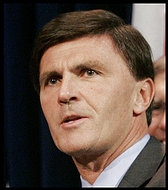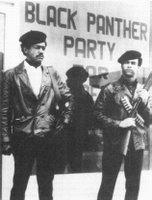Historian Morris Berman outlines the fall of the American Empire in Dark Ages Americaby Vince Darcangelo
Boulder WeeklyMorris Berman's
Dark Ages America: The Final Phase of Empire probably won't make anyone's Best Books for the Beach list this summer. Let's just say it doesn't have a happy ending—or beginning or middle. What Dark Ages America does have is a heavy helping of facts and commentary concerning the modern-day United States—and the news isn't good. Berman offers a hard, honest look in the mirror many Americans aren't willing to take, declaring that America's global supremacy has reached its end. Putting us in historical context, Berman draws comparisons between 21st-century America and the latter days of the Roman Empire, concluding that America is entering a dark age that will reduce us to second- or third-rate status by 2040, and that it is too late to reverse course.
A cultural historian, Berman first garnered attention with his 2000 book The Twilight of American Culture, in which he rightly predicted that America would soon come under attack as a counter-response to our corporate- and military-driven global policies. In Dark Ages America, Berman says that we've yet to learn the lessons of 9/11 and have set a course for cultural collapse and global irrelevance. He does so by discussing the moral decay of American culture, the blundering invasion of Iraq, the near-comical political missteps of the Bush administration, and an in-depth exploration of America's global policies in the 20th century, examining our postwar rise and our post-Vietnam fall.
On Monday, Berman will appear at the Boulder Book Store. Prior to that he hooked up with Boulder Weekly to discuss the fall of the American Empire, why we can thank Jimmy Carter for 9/11 and the invasion of Iraq, and what kind of beer he'd like to drink with everyone's favorite ex-president.
Boulder Weekly: What was the motivation for writing Dark Ages America, and what sort of response do you hope the book elicits?
Morris Berman: I never expected to write it. I had written The Twilight of American Culture, and it appeared 15 months before 9/11... After 9/11, something was staring at me so obviously. In Twilight, I had done a comparison of the contemporary United States and Rome in the late-empire period. I compared the two in terms of structural factors that were doing each civilization in and arguing that they were the same factors.
But there was one point of comparison that I completely overlooked, and that became apparent only after 9/11—that was that Rome was invaded and then fought a long war of attrition that was finally lost. That's what happening to us. There is no way we're going to defeat terrorism. It's an elusive technique. How can you defeat terrorism?
Not that al Qaeda can win, but they've got lots of time and lots of anger. They're going to keep doing what they're doing, and we're going to keep disintegrating.
There was the motivation. As far as my guess of what difference it will make, I would say none at all... I expect to be vilified and ignored.
BW: Which would you prefer?
MB: There is this saying that bad press is better than no press. I don't know if that's true. Part of the problem of being vilified is that it usually involves a distortion.
BW: If what you're saying is true and there's nothing we can do about it, shouldn't I be stockpiling weapons for the coming Dark Age instead of reading this book?
MB: The question is what you would use the weapon on. Maybe we should just shoot ourselves. In Twilight I talked about the one thing people could do was cultural preservation... I saw that as the only solution, but it's not really a solution. When finally the only thing that can be done is what individuals can do, that means the system has completely broken down. Our problems are structural, and if problems are structural, then the solutions have to be structural. That's Sociology 101. Individual solutions are nice, but they're not solutions, they're responses. It would be nice if people preserved things, but I don't believe there's a hope in turning this situation around. It's not a question of whether optimism is good and pessimism is bad. It's a question of, alright, if you don't believe what I'm saying when I say there is no way of turning things around, show me the levers of social change, point to them, tell me how this is gonna happen.
And don't point to the Democratic Party, because the Democratic Party is intellectually bankrupt and politically impotent. Don't talk to me about Hillary, for God's sake. She's rattling the sabers against Iran. What a joke. The Democratic Party has essentially bought into the Republican Party. We saw that during the Clinton years; he was just a Republican in Democratic clothing. The choice between the Republicans and Democrats is the choice between empire and empire-lite.
We do not have a large section of this country up in arms. They just aren't. They may give Bush a low approval rating, but the truth is that if we were winning the war in Iraq his approval rating would be very high. It's not a moral objection or a political objection—most Americans have no understanding of the war in Iraq; they don't even understand what happened except that it didn't work out well. We're in a situation where we can torture people. To my knowledge, we're the first modern nation that has made torture legal. On top of that, we put the guy who legalized it head of the Department of Justice. George Orwell move over. This is surreal.
And Americans aren't upset about that. They're not upset about Abu Ghraib. I would even argue that Bush got reelected because of Abu Ghraib, not in spite of it. It's not like Americans are upset that people can be detained indefinitely without trial and the right to an attorney. They're not upset that the NSA is spying on them. I don't know what it would take to get the American people upset. You could probably herd Iraqis into gas chambers and Americans would say, "Gee, we shouldn't be doing that." The days of Vietnam protests are definitely not here. We don't have a similar situation. We don't have a public that's aware, outraged or even upset. We have a public that basically is drugged, apathetic and interested in shopping.
BW: In the book you say that America "may be only one more terrorist attack away from a police state." Should this occur, how do you think the American public would respond? Do you think people would have this moment of recognition that they were complicit in the erosion of civil liberties that permitted the institution of a "police state"?
MB: I don't think so. After all, there's a large section of statistics about American awareness, including American attitudes toward the erosion of civil liberties. Something like a third are opposed to the Bill of Rights. I have to say this is true even of people that are very intelligent... The truth is that very bright people in large numbers voted for George W. Bush, supported the war and continue to think that he's even wise. And these are quite intelligent people. You have to ask how is that happening. There's something going on with this enormous blind spot that comes out of fear and a preconceived framework and so on. It's not like people are turning around and saying there's something horribly wrong, we're on the wrong track. When you have bright people supporting these policies and the erosion of civil liberties and so on, the comparison, it's a bit of a strain, but 10 percent of the Nazi party held Ph.Ds. This is not merely about the ignorance or stupidity of the American people in terms of a blue-collar ignorance of the Bill of Rights or something like that. It's bright people saying that this is OK. What could be more powerful in terms of digging ourselves into a grave? So when I say we might be one terrorist attack away from a police state, it seems pretty obvious because we're going to respond by rallying around repressive policies, not by saying that somehow we're exacerbating the whole problem. Even bright people are going to say that. I don't see what hope there is.
After all, after 3/11—when 200 people were killed in the bombings of Madrid—three days later there was an election and they voted out Aznar, who backed Bush, and they voted in a socialist government. This is what I call an intelligent populace.
BW: Do you think that all this could get so awful that it could lead to a second American Revolution?
MB: Yeah, I think it would, but if a revolution occurs in the United States, it can only happen from the Right. It can't happen from the Left. We don't have a tradition of that... It's not like we have this enlightened public. We're not like Europe. We don't have their understanding of things. Americans don't make those kinds of connections; we're not trained historically. In order to understand what's going on right now with the American Empire, you have to figure out—and this is the crucial point—that 9/11 did not emerge out of a political vacuum. It had a history. We did certain things over a long period of time in the Middle East and to Arab people. Since they could never get a hearing, finally that's what occurred. That doesn't justify the death of 3,000 civilians—I'm not saying that. But how do you justify the death of a half million Iraqi children over the sanctions? How do you justify the deaths of 100,000 Iraqis now? The butchery that we've visited upon that nation, what they did to us was nothing compared to what we've done to them, but Americans don't make those kinds of connections.
It was the same thing with the Ayatollah Khomeini revolution. After all, we put the Shaw in power in 1953. That regime was brutal; it tortured people. We supplied the torture equipment and the torturers and everything else. Then the American people, when that revolution takes place and they take our hostages, instead of the American people saying, "Well, what would you expect?" They react with horror and outrage and their feelings are hurt. This is really bright. Boy, that's really thinking historically.
When I say hopeless, I'm talking hopeless. How many books have I read? Bowling Alone by Robert Putnam. There's so many that have shown that the nation's going to hell in a basket, let me give you the data, and then in the last 10 pages somehow they pull a rabbit out of a hat. I mean, optimism is a great thing, but if it's not based in reality it's called stupidity. My question to Putnam or any of those folks is, well, that's great, but show me the mechanism of how that's going to change. Show me who it is. In order for that to happen, Americans have to make certain types of connections. And to sit around and say the people that precipitated 9/11 are simply evil and insane, this is not an analysis. We're not going to have that analysis. It's not going to happen.
BW: What's interesting to me is that you look at Jimmy Carter and his role in current events. While you applaud some of the stuff that he did, you point out in the book that even he made diplomatic errors, in particular the Carter Doctrine in 1980 that started the military buildup in the Persian Gulf. You attribute both 9/11 and the U.S. invasion of Iraq to Carter and his response to the Soviet invasion of Afghanistan in 1979. If the most levelheaded president of my lifetime can screw up this badly, then what hope is there? Carter was the alternative. What alternative is left?
MB: Yeah, it's a tragic story. I have to tell you, if there's one person I'd like to sit down and have a beer with, it's Jimmy. I wonder what's in his mind in the sense that he was the person who really understood that we were causing our problems. The whole business about spiritual malaise and soul searching and having to cut back on energy and how we were engaged in human-rights violations, he saw it all. And then, under the pressure of losing popularity and the influence of [Carter's National Security Advisor] Zbigniew Brzezinski—who, after all, is a Pole who hated the Soviet Union—the Carter Doctrine emerged. Not only that, Brzezinski, in 1998, did an interview in Paris in which he admitted that he and Carter started training the Muhjadeen planning to draw the Soviet Union into Afghanistan six months before they invaded. They set a trap for them. 9/11 is the blowback from Carter's policies. What an incredible irony.
The real problem is that we've never been able to get out of the Cold War mentality. As much as Carter tried, he couldn't do it. He couldn't see that what the Soviet Union was doing with Afghanistan was a defensive move against the Arab world, which we then, of course, got into later on.
So it's very, very hard to break that grip of this Cold War belief that there's this great evil out there and our goal is to combat it. It's now quite clear from KGB documents that have been opened up that the Soviet Union was risk-averse. They were not interested in engaging us. We were the ones goading. In fact, their greatest fear was Germany, not the United States. That whole war is now being rewritten. When I see in the National Security Statement of 2002, written by Condoleeza Rice, when I see her writing that during the Cold War we faced a risk-averse adversary, this is a statement that could never have been uttered during the Cold War. Now it's OK to say it because we have replaced the enemy with another one—and this one, of course, is different and completely black and dark and horrible. We've always got to have a Hitler.
BW: It would appear that the Cold War was largely an invention designed to maintain the U.S. and U.S.S.R. as superpowers. However, this battle of gestures led to proxy wars, such as Afghanistan, that mobilized the Arab world, in turn creating a fervent enemy that is real.
MB: Finally, it was a self-fulfilling prophecy. That's essentially what really happened. I'm not saying to our readers that I think 9/11 was imaginary or that it didn't occur. I'm saying that finally you do enough crummy things to a certain segment of the world and, you know what, they're going to get angry.
BW: Going back to Jimmy Carter for a moment, you quote historian Gaddis Smith regarding Carter, saying that he failed "because he asked the American people to think as citizens of the world with an obligation toward future generations." You then ask, rhetorically, who really failed, Jimmy Carter or the American people. Looking at that moment in U.S. history—that hiccup of reason and perceived failure in U.S. diplomacy—do you think this was the point at which America was lost? Was Carter our last shot of getting out of that Cold War mentality?
MB: I think so. If we wanted to think not solely in terms of personality but in structural terms, George Modelski, a political scientist, wrote a book Long Cycles in World Politics. He distinguished in every civilization four phases. The final phase, the serious bit of decline, he assigned to the period 1971-1975. What he really said was in 1971 you had the repeal of Bretton Woods, and that was the launching of finance capitalism—in other words globalization really took off at that time. The second thing that occurred was Vietnam, which bled us incredibly—not only morally, but it cost roughly two-thirds of a trillion dollars in 1967 dollars. That was so debilitating to us, and we lost the war on top of it.
It was only at a point like that, where we were so weakened, that the patient is willing to turn to the therapist when they're about to have a nervous breakdown. That's what happened to the United States. By 1974 you had [Sen.] Frank Church doing all those hearings about all the crummy things the CIA was doing. There was Watergate. There was a crisis of nerve. Then Jimmy comes along from a Christian point of view that I admire. Bush sits around reading the gospel of death. Jimmy Carter's kind of Christianity was not necessarily turn the other cheek, but that the world was more complicated than just the enemy being out there. In classic terms, original sin exists across the board. What's ours? He really wanted us to do some soul searching. By 1976, when he got elected, I think we needed that. The American people were willing to listen to someone who was talking in those terms.
The only problem is that's to swim against the tide of American history. Our whole history, from the revolution, has been posited about defining ourselves in terms of opposition. It was about not being someone else. There's a problem with that. If you're going to define yourself in terms of what you're not, in a certain sense you're never going to figure out who you are. That's the Achilles heel in American history, that we don't know. As a result you're always going to be nervous, you're always going to be on edge, and you're always going to be projecting the problem outward. Jimmy comes along at the right time and says lets not look outward and look at ourselves. For a couple years we were willing to do that, but it was something so out of step with the rest of American history that it couldn't be sustained. So you had, at that time, the mobilization of things like the Committee on the Present Danger, Paul Nitze, the great Cold Warrior, was a part of that, Jeane Kirkpatrick writing this criticism of Carter being friendly to left-wing regimes and not right-wing regimes. It just increasingly undermined the idea of soul searching and not supporting dictatorships.
Then finally you had the Hollywood version of what the future of America would be in the person of Ronald Reagan... He weaved a story, a "Morning in America" and how great it was going to be. It was based on no reality whatsoever, and that's exactly what people wanted to hear. They took the Hollywood version, and we're living the consequences of that now. All the vilification of George W. Bush is entertaining—and I'm certainly willing to pitch in and help—but the truth is that Bush didn't come out of nowhere any more than 9/11 came out of nowhere. We have a history too. It takes a nation of ignorance and violence to produce a president like Bush. He really reflects very important trends in the American public. And although I would say in many ways the presidency of George W. Bush is a quantum leap over previous things, it is not without its continuous strands. We're living with the consequences of that and with an American people that are much more interested in fantasy than reality.
BW: You state at the end of Chapter Four that for us to reverse course "requires a grace, a flexibility and an imagination" that you believe Americans don't have. What do you think it would take for Americans to acquire this grace, flexibility and imagination? Would it require outside intervention?
MB: Well, in a dramatic sense, an act of God, because it's not going to happen. To take the examples of two nations that were on a supremely self-destructive course—Germany and Japan in the '30s and '40s—what it took to get them to turn around was that they were utterly and totally destroyed... It wasn't going to stop until the United States in particular came along and made it impossible for them to continue.
I don't believe that al Qaeda is going to destroy us. They're going to erode us, but it's not like they're going to be firebombing Minneapolis. It's not going to happen in the same way, but what will happen—the appropriate model is not Germany or Japan but ancient Rome. It basically died from a thousand cuts.
I have to tell you that somewhere—I don't believe he's in a cave; I have a feeling he's in a library at the University of Islamabad working the Internet—but somewhere Osama bin Laden is looking at this, and he's saying, "Thank you, George W. Bush. You did it better than I could have ever imagined."
BW: You pose the question: Who will take over for us, China or the European Union? Who would you say is the frontrunner right now? Could you see a third possibility, such as a Middle Eastern power, say Saudi Arabia, rising to take the place of the American Empire? And if so, would it be one Arab country or a conglomerate similar to the European Union?
MB: I don't think that the Arab nations have it to get their act together. Those regimes are terribly corrupt. They also are very oppressive of their people. I think that the Arab nations will play... the role of the source of attrition that weakens us beyond belief and beyond repair. Their historic role is that they will be the thousand cuts that debilitate us.
While we're wasting all our money, time and energy fighting this shadow enemy, the money is piling up in China and the E.U. They consider us, privately, quite pathetic... They're busy building their economies and doing the types of things that intelligent civilizations do. So, it's hard to know in that contest what will happen. But I have no doubt in my mind that by 2040 we will be taking our marching orders from other people.
BW: What do you think that will look like? Will it be a situation where we kind of disappear? Or will it be more like England, where they're still a relevant country, they just don't have the empire like they used to?
MB: Yeah, they live under a cloud and, the famous phrase, they've become America's poodle. I see something like that as the likely scenario. These things move slowly, and there's a cultural lag. But let me give you the relevant scenario:
Most historians understand now that Britain was really economically in serious trouble and really had feet of clay by the time the Boer War ended in 1902. Looking back, that was really when the rot set in. And by the end of World War I they were in real trouble. That's when the breakup of large estates occurred, and all the economic analysis that's been done of England says that they didn't have a hope in hell by certainly 1918, but even by 1902.
However, the appearance of England in 1902—after all, Queen Victoria was still alive—was the sun never sets on the British Empire. This was the great power. Down to something like 1950, that was still the image of England.
Then an interesting thing happened—the Suez Crisis. Eisenhower was very angry with England, France and Israel, and he threatened to cause the pound to be devalued if England didn't back off. They knew they had to do it. At that moment, the cultural lag caught up to reality. At that moment there was an international shift. Everybody understood what some people understood in 1910 and 1920 and 1930: that England was no longer a serious player. We are no longer a serious player. It's just that there are very few people now who recognize it. There has to be something that's equivalent to Suez. There was some hint of that when Rumsfeld went over to Germany and said to Joschka Fischer, who was then the foreign minister, you've got to join us and we're going to defeat Iraq, and he said, "I'm not convinced of any of this." That Germany would say to the United States that you're full of crap, there was already a hint that something had shifted, but it didn't have the international force of something like Suez. But Suez is in our future. There is no doubt in my mind about that. There will come a time when there will be an incident, and it will be understood that the United States has eaten itself alive and doesn't have the clout to respond. After that, it will slowly drift in the direction that England has drifted today. People will pay lip service to its grandeur and its history and all that, but a poodle is not a tiger.
BW: You mentioned before that if you could sit down and have a beer with anyone, it would be with Jimmy Carter. Would it be a Billy Beer?
MB: Would it be what?
BW: Billy Beer?
MB: What is Billy Beer?
BW: That was Carter's brother's beer in the '70s.
MB: What did it taste like?
BW: Crap.
MB: Well, I'm hoping Jimmy and I can find a nice little microbrewery.
Respond:
letters@boulderweekly.com
 New York, California and eight other states are suing EPA again over refusing to regulate carbon dixode emissions from power plants. New York Attorney General Eliot Spitzer is the lead plaintiff in this new litigation as he was in the old litigation that was dismissed last year by the U.S. Court of Appeals for the District of Columbia Circuit. Of course, Congress has refused to pass carbon dioxide legislation and EPA refuses to list it with the other six criteria pollutants (sulfur dioxide, nitrogen oside, ozone, carbon monoxide, particulate matter, and lead). Mercury was recently added to the list for the first time under the Bush administration.
New York, California and eight other states are suing EPA again over refusing to regulate carbon dixode emissions from power plants. New York Attorney General Eliot Spitzer is the lead plaintiff in this new litigation as he was in the old litigation that was dismissed last year by the U.S. Court of Appeals for the District of Columbia Circuit. Of course, Congress has refused to pass carbon dioxide legislation and EPA refuses to list it with the other six criteria pollutants (sulfur dioxide, nitrogen oside, ozone, carbon monoxide, particulate matter, and lead). Mercury was recently added to the list for the first time under the Bush administration.



















